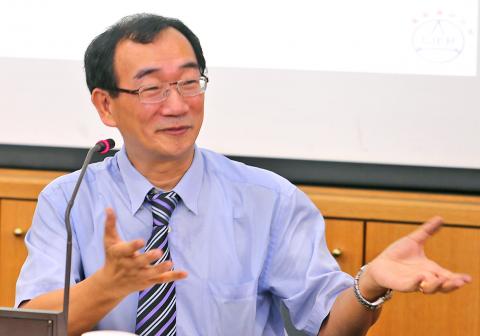The Chung-Hua Institution for Economic Research (CIER, 中華經濟研究院) yesterday cut its forecast for GDP growth for this year to 3.04 percent, down from the 3.56 percent it projected in April, as a global economic slowdown, especially in China, affects exports.
However, academics who joined the discussion challenged the institution’s new forecast, saying it would be difficult — if not impossible — for the economy to expand 3 percent this year and the government should focus its resources on improving domestic demand.
Exports, which drove more than 70 percent of GDP growth in the first quarter, are predicted to grow 3.88 percent this year, sharply down from a prior estimate of 6.26 percent growth, the CIER report showed.

Photo: CNA
“The second half may put up a weaker performance compared with the first half owing to a higher base,” CIER researcher Peng Su-ling (彭素玲) told a media briefing.
GDP growth likely reached 3.11 percent in the first half of the year, but could decelerate to 2.97 percent for the rest of the year, with major economies proving to be weaker than expected, Peng said.
Slowing global growth is unfavorable to Taiwanese exports, which contracted 7.1 percent in the first half, the report said.
Taiwanese exports to major trading partners, notably China and Southeast Asian nations, are declining, while South Korea is gaining market share, the report said.
The trend suggests declining competitiveness among local exporters, Peng said.
To make things worse, China is reducing its dependence on imports of electronic components from Taiwan, as it builds up its own supply chain as part of its economic restructuring, Peng said.
On the currency front, the New Taiwan dollar has risen 2.67 percent versus the US dollar so far this year, while the yen and the won have retreated 1.89 percent and 1.5 percent respectively over the same period, Peng said.
A strong NT dollar is eroding exporters’ bottom lines, he said.
Government agencies are looking for ways to boost the nation’s exports and the economy as a whole, with some academics suggesting establishing a sovereign wealth fund to help finance social welfare spending and others calling for the establishment of a more investment-friendly environment.
Bills Finance Association (票券公會) chairman Hermann Wu (吳正慶) said that he and his peers doubt the economy can grow by 3 percent this year.
National Central University economics professor Chiou Jiunn-rong (邱俊榮) suggested that the government focus its efforts on strengthening domestic demand to support economic growth.
However, he added that the government gives too much importance to GDP figures.
“GDP growth may not improve or reflect the well-being of the public the way a wage increase does,” Chiou said.

ENDEAVOR MANTA: The ship is programmed to automatically return to its designated home port and would self-destruct if seized by another party The Endeavor Manta, Taiwan’s first military-specification uncrewed surface vehicle (USV) tailor-made to operate in the Taiwan Strait in a bid to bolster the nation’s asymmetric combat capabilities made its first appearance at Kaohsiung’s Singda Harbor yesterday. Taking inspiration from Ukraine’s navy, which is using USVs to force Russia’s Black Sea fleet to take shelter within its own ports, CSBC Taiwan (台灣國際造船) established a research and development unit on USVs last year, CSBC chairman Huang Cheng-hung (黃正弘) said. With the exception of the satellite guidance system and the outboard motors — which were purchased from foreign companies that were not affiliated with Chinese-funded

PERMIT REVOKED: The influencer at a news conference said the National Immigration Agency was infringing on human rights and persecuting Chinese spouses Chinese influencer “Yaya in Taiwan” (亞亞在台灣) yesterday evening voluntarily left Taiwan, despite saying yesterday morning that she had “no intention” of leaving after her residence permit was revoked over her comments on Taiwan being “unified” with China by military force. The Ministry of the Interior yesterday had said that it could forcibly deport the influencer at midnight, but was considering taking a more flexible approach and beginning procedures this morning. The influencer, whose given name is Liu Zhenya (劉振亞), departed on a 8:45pm flight from Taipei International Airport (Songshan airport) to Fuzhou, China. Liu held a news conference at the airport at 7pm,

Taiwan was ranked the fourth-safest country in the world with a score of 82.9, trailing only Andorra, the United Arab Emirates and Qatar in Numbeo’s Safety Index by Country report. Taiwan’s score improved by 0.1 points compared with last year’s mid-year report, which had Taiwan fourth with a score of 82.8. However, both scores were lower than in last year’s first review, when Taiwan scored 83.3, and are a long way from when Taiwan was named the second-safest country in the world in 2021, scoring 84.8. Taiwan ranked higher than Singapore in ninth with a score of 77.4 and Japan in 10th with

GRIDLOCK: The National Fire Agency’s Special Search and Rescue team is on standby to travel to the countries to help out with the rescue effort A powerful earthquake rocked Myanmar and neighboring Thailand yesterday, killing at least three people in Bangkok and burying dozens when a high-rise building under construction collapsed. Footage shared on social media from Myanmar’s second-largest city showed widespread destruction, raising fears that many were trapped under the rubble or killed. The magnitude 7.7 earthquake, with an epicenter near Mandalay in Myanmar, struck at midday and was followed by a strong magnitude 6.4 aftershock. The extent of death, injury and destruction — especially in Myanmar, which is embroiled in a civil war and where information is tightly controlled at the best of times —